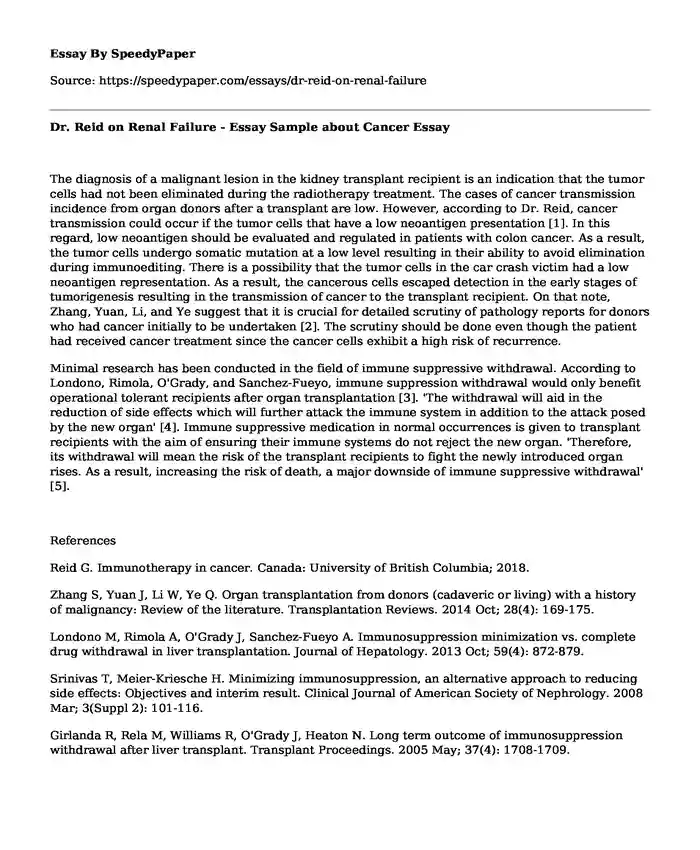The diagnosis of a malignant lesion in the kidney transplant recipient is an indication that the tumor cells had not been eliminated during the radiotherapy treatment. The cases of cancer transmission incidence from organ donors after a transplant are low. However, according to Dr. Reid, cancer transmission could occur if the tumor cells that have a low neoantigen presentation [1]. In this regard, low neoantigen should be evaluated and regulated in patients with colon cancer. As a result, the tumor cells undergo somatic mutation at a low level resulting in their ability to avoid elimination during immunoediting. There is a possibility that the tumor cells in the car crash victim had a low neoantigen representation. As a result, the cancerous cells escaped detection in the early stages of tumorigenesis resulting in the transmission of cancer to the transplant recipient. On that note, Zhang, Yuan, Li, and Ye suggest that it is crucial for detailed scrutiny of pathology reports for donors who had cancer initially to be undertaken [2]. The scrutiny should be done even though the patient had received cancer treatment since the cancer cells exhibit a high risk of recurrence.
Minimal research has been conducted in the field of immune suppressive withdrawal. According to Londono, Rimola, O'Grady, and Sanchez-Fueyo, immune suppression withdrawal would only benefit operational tolerant recipients after organ transplantation [3]. 'The withdrawal will aid in the reduction of side effects which will further attack the immune system in addition to the attack posed by the new organ' [4]. Immune suppressive medication in normal occurrences is given to transplant recipients with the aim of ensuring their immune systems do not reject the new organ. 'Therefore, its withdrawal will mean the risk of the transplant recipients to fight the newly introduced organ rises. As a result, increasing the risk of death, a major downside of immune suppressive withdrawal' [5].
References
Reid G. Immunotherapy in cancer. Canada: University of British Columbia; 2018.
Zhang S, Yuan J, Li W, Ye Q. Organ transplantation from donors (cadaveric or living) with a history of malignancy: Review of the literature. Transplantation Reviews. 2014 Oct; 28(4): 169-175.
Londono M, Rimola A, O'Grady J, Sanchez-Fueyo A. Immunosuppression minimization vs. complete drug withdrawal in liver transplantation. Journal of Hepatology. 2013 Oct; 59(4): 872-879.
Srinivas T, Meier-Kriesche H. Minimizing immunosuppression, an alternative approach to reducing side effects: Objectives and interim result. Clinical Journal of American Society of Nephrology. 2008 Mar; 3(Suppl 2): 101-116.
Girlanda R, Rela M, Williams R, O'Grady J, Heaton N. Long term outcome of immunosuppression withdrawal after liver transplant. Transplant Proceedings. 2005 May; 37(4): 1708-1709.
Cite this page
Dr. Reid on Renal Failure - Essay Sample about Cancer. (2022, Sep 21). Retrieved from https://speedypaper.net/essays/dr-reid-on-renal-failure
Request Removal
If you are the original author of this essay and no longer wish to have it published on the SpeedyPaper website, please click below to request its removal:
- Essay Sample on Dignity and Meaning through Nursing
- Prose Analysis Essay Example on A Rose for Emily by William Faulkner
- Free Essay Sample on Communication Styles
- Free Essay Sample on Ear Diseases
- Free Essay: Transitions of Care and the Prevention of Readmissions
- Essay Sample on The Voucher System
- Paper Example. Effects of New Smoking Regulation in Italy
Popular categories





